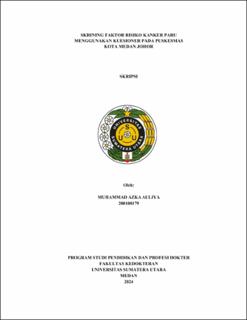Skrining Faktor Risiko Kanker Paru Menggunakan Kuesioner pada Puskesmas Kota Medan Johor
Lung Cancer Risk Factor Screening Using a Questionnaire at Medan Johor Health Centre

Date
2024Author
Auliya, Muhammad Azka
Advisor(s)
Soeroso, Noni Novisari
Metadata
Show full item recordAbstract
Background. Lung cancer remains one of the malignancies with high morbidity
and mortality rates in Indonesia. Accurate identification of lung cancer risk
factors is crucial for disease prevention and management. The NARU (Kenali
Paru) questionnaire has been developed and validated as a screening tool to
identify risk factors and assess lung cancer risk scoring. Methods. This research
employed an observational descriptive study design. Data were collected from
180 respondents who met the inclusion criteria at Medan Johor Primary
Healthcare Centre. The NARU questionnaire was utilised to gather information
about lung cancer risk factors. Data were analysed using descriptive statistics to
determine the distribution and levels of lung cancer risk scores. Results. The
findings revealed that lung cancer risk scores were categorised into three groups:
low risk (≤11 points) comprising 11 individuals (5.6%), moderate risk (12-16
points) comprising 45 individuals (25.1%), and high risk (17-29 points)
comprising 125 individuals (69.3%). In the high-risk scoring group, the
predominant risk factors were: family history of non-lung cancers (79 individuals,
63.2%) and lung cancer (72 individuals, 57.6%), carcinogenic occupational
exposure (76 individuals, 60.8%), residence near pollution sources (124
individuals, 99.2%), inadequate living conditions (67 individuals, 53.6%), and
previous medical history of tuberculosis (75 individuals, 60%) and COPD- ILD
(14 individuals, 11.2%). Results and Discussion. This study demonstrates that the
NARU questionnaire effectively identifies lung cancer risk factors and determines
risk scores. However, several limitations warrant attention. The NARU
questionnaire requires optimisation and additional questions for subpopulations
with comorbidities or other specific health conditions.
Collections
- Undergraduate Theses [2272]
